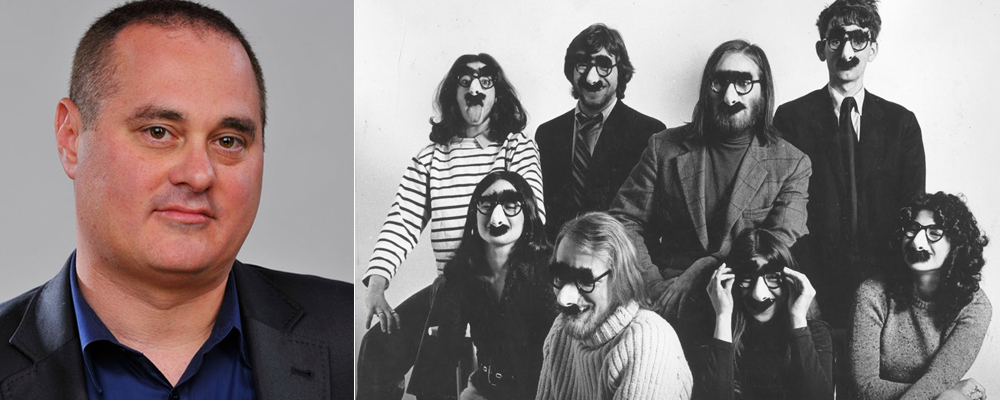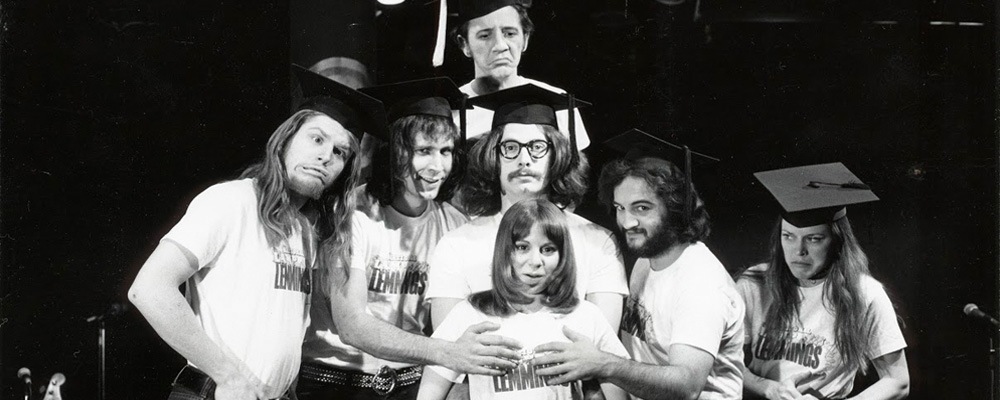‘Drunk Stoned Brilliant Dead’ Filmmaker Talks National Lampoon and No Limits Humor
Sandra Miska
“Drunk Stoned Brilliant Dead: The Story of the National Lampoon,” a new documentary on the history of the beloved counterculture humor magazine and the franchise it created, is the work of filmmaker and fan Douglas Tirola.
Having been born in 1968, Tirola was too young to buy the magazine during its heyday in the seventies, but eventually became a fan nonetheless. He described to Entertainment Voice how as he spotted the poster for the raunchy college comedy ”National Lampoon’s Animal House” in 1978 and was so intrigued that he talked his father into taking him to seeing the film, and his love for the brand grew from there.
Now the owner and president of the New York-based production company, 4th Row Films, Tirola has channeled his passion for all things National Lampoon in this new documentary, which he was inspired to make after a dinner with a bunch of “Wall Street-types” during which another guest accused him of going too far during a debate.
“I thought about that, and soon after that I was looking through some of my Lampoon stuff I kept with me, and I was like, ‘Wow, I think this had a bigger influence on me,’” he told EV. “Part of what the Lampoon is no limitations. Just the complete freedom of expression….”
Tirola recently sat down and spoke with us about interviewing the likes of Chevy Chase, comedy today, and the legacy of the National Lampoon.
Whom did you meet with first? How did you go about securing all your interviews?
That’s a good question. Maybe this is not a surprise. This was not the sorta movie where these people were waiting by the phone to be in a documentary. Whether they were well known, or someone maybe no one has heard of since they picked up an issue of the Lampoon, most of them didn’t use to make the movie. They did not think anybody was capable of doing justice to the story, and because most of them have been working in the entertainment business in some form their whole lives, they were highly skeptical. So, it really became more of a process that I think you would associate with having an independent scripted movie where one-by-one you’re trying to get people to take these roles on. It involved a lot of like, you know, I remember talking to [National Lampoon writer/editor] Tony Hendra in my car. I had gotten a call from him when I was driving around Manhattan. I pulled over and he was like, “What’s your take? What’s your take?” Him being tough, like, “What is your vision for this film?” was the way most of them were. The first person we interviewed was a guy named Christopher Cerf, who some people might know his dad, who was a very famous publisher named Bennett Cerf, and he worked at the Harvard Lampoon with these guys, worked at the National Lampoon. He’s become a prolific humorist and he also has 12 Emmys for “Sesame Street.” That’s an odd combination… Ron Barrett, the guy who [illustrated] Cloudy with a Chance of Meatballs also worked at the Lampoon. There’s this whole weird kid Lampoon thing. …What we try and do is to interview people and hopefully it’s a good experience for them. I used to be a location manager on bigger studio films, so I was luckily trained by people who [taught me that] you leave everything in a good condition. Even if you’re not coming back, someone in your field is coming back, so hopefully you seem a little nicer, more polite than some of the other people, so hopefully they will tell the other guy who is on the fence, “Yeah, they’re okay.” I think they took the defense off. So that, you know, you just build and you go and you go. Some of the toughest interviews that I got are the two that people point to the most, Chevy Chase, who’s apparently, not always in the best mood, but gives an amazing- I wouldn’t even refer to it as an interview. It’s really a performance. He really is a great interview and he’s very generous with his time, and I think for people who like him, they’re going to really like him in this movie, and people who are just interested in him and maybe love to not like him are going to appreciate him in this movie. And then Henry Beard, one of the founders of the Lampoon, who has gone one to write a number of books, he just did one with Christopher Cerf called Spinglish… So he had not talked about the Lampoon since he has left in 1975, and pretty much everyone I spoke to would say, “Are you going to get Henry Beard?” Before you could even breathe, they’d say, “You’re never going to get him.” It’s like they took glee in telling us we’re not going to get him. Because I didn’t know if I would get him, I went and watched a bunch of rock ‘n’ roll documentaries where the lead singer was dead. Because I’m like, we don’t have him and [co-founder] Doug Kenney is dead. Basically, some of our main characters are unavailable. So we had a cut of the film ready to submit to festivals like Sundance most notably in August, and we got a call back from him after, like, 22 calls finally saying he would do it. And he gave us a great interview filled in a bunch of stuff for us that I don’t think was adequate from other people. He just knew things that other people couldn’t. So, again, to get it first-hand so it feels like this scripted experience, this living in real time experience, as opposed to just reminiscing about the good old days, he really helped with that. I feel for real fans of the Lampoon, the fact that he is in the movie is a big deal.
Who was your favorite person that you interviewed?
Douglas Tirola: Oh my God. That’s like kids. Who’s your favorite kid? I’m really proud of that Chevy Chase interview, in terms of just like a director and an actor. I think sometimes when you have a talking heads movie, people forget that you have to solicit certain information or it doesn’t make sense, as opposed to a cinema verite movie, where you have an advantage of following someone around when there’s a story unfolding with their actions. It still involves this trust and this comfort level, but, you know, you can’t get certain people to say certain things, or it falls apart. I’m proud of that. I’d say that I really enjoyed meeting maybe some of the people that might not be known to movie audiences as much. Some of the writers and artists, like Janis Hirsch, who worked there, is just great, and she’s incredibly funny. Al Jean and Mike Reiss, who people know from “The Simpsons”… Coming from the New York production world, you always have some mini celebration after almost every day, unless you have to get up really early the next morning, and where you’re sorta going, “Hey, our job today was that we got to talk to these people for a few hours.” Because they’re just so interesting. There were no duds. That’s what I would say, maybe more than, “Who is my favorite?” It’s that there was nobody where you’re like, “This guy must’ve been the most boring person at the Lampoon.” They all would be the most interesting person at any dinner party you went to now. It’s the wealth of information.
Nowadays, when you hear about the National Lampoon, it’s usually in relation to “Saturday Night Live.” What do you think about that?
Douglas Tirola: I think, you know, there’s no doubt that- I would not say that Lorne Michaels or “Saturday Night Live” stole the Lampoon [writers and radio show actors] to be in “Saturday Night Live.” I would say that they gave them this opportunity that the Lampoon wasn’t providing for them. As the movie says, they were- NBC came to [the Lampoon]. And I’d say they were doing so much, there were financial issues and there wasn’t a TV guy there. With “Animal House,” Ivan Reitman had worked with the Lampoon, and he had at least made one movie. Granted, it was “Cannibal Girls,” a low-budget Canadian horror shocker, but at least he was a movie person. When they did the radio show, when they did the first album, they had someone there who at least had one album. They didn’t have someone from TV. So when they passed on that opportunity, it made sense for those people to say, “Let’s go for it.” But eleven-thirty on a Saturday night made no sense then, because it’s a show geared towards people in their twenties and it’s going to play on a Saturday at eleven-thirty? Remember, they didn’t have new programming in the summer, because they didn’t want to be inside watching TV was the thought. So, I think that any connect between “Saturday Night Live” and the National Lampoon that people recognize is good for both of them. People who know the National Lampoon story should feel better about coming from being fans should feel better about “Saturday Night Live,” and “Saturday Night Live,” in turn, should feel better because there’s a certain credibility, a higher end sorta view of National Lampoon that they benefit from. I think what’s more upsetting that people think about is the movies that came later, the ones that people under 30 know most about, all the movies that were not made by the Lampoon, but from a moment in time when the person running it licensed the name. The one that people go like, “This is good,” is the “Van Wilder” movie, where even they’re getting Tim Matheson to be in it to really connect you to “Animal House.” All those movies are to make you think of “Animal House. They’re all sorta college, high school based. I think the one with the beat title that sums the whole thing up is “National Lampoon’s Master Debaters.” …That says it all. It’s completely exploitative. It’s sex, “Animal House” a few decades on and they paid for the National Lampoon name to be on it. Which shows you how much it still meant, 30, 40 years later. But that’s more disappointing that people think of that. I want them to think of this, and then look at it as a political statement and almost go, “Why don’t we have anything like that anymore?” “Why doesn’t ‘The Daily Show’ just go a little bit further?” I think at moments Howard Stern does, Bill Maher does. I think Howard Stern is immersed in it because of his age. He has that no limitations thing that the Lampoon, I don’t know if we would say, might’ve influenced him. Bill Maher, his scripted thing, there’s something in that. There are moments like that on “The Daily Show” and the Colbert show that are one big parody. It’s a little bit different. I just hope people seek it out. And that next time that they’re somewhere where someone’s being picked on for saying something that’s a little off-color, they go, “Hey, it’s alright. This guy’s just trying to make a point. He’s saying what we’re all thinking. Get over it.”
“Drunk Stoned Brilliant Dead: The Story of the National Lampoon” is showing at the Nuart Theatre in Los Angeles beginning Oct 2. It is also available to view on VOD.


